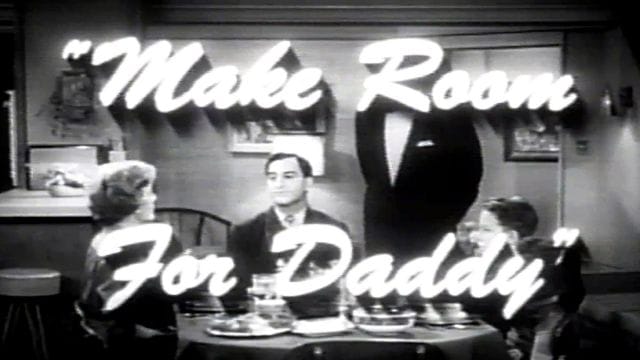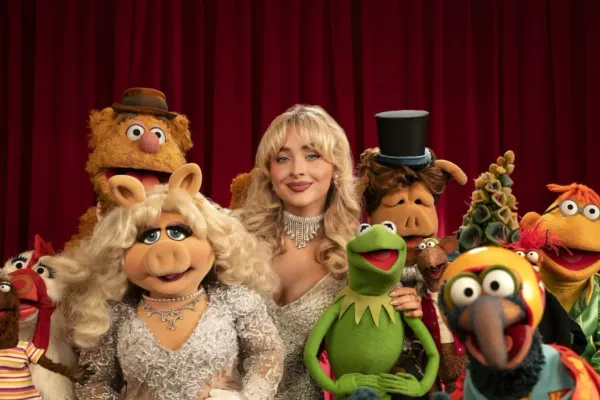Episodes: Make room for time travel (Spoilers for Make Room for Daddy, I guess?)

Until today, I'm relatively certain I had never seen an episode of Make Room for Daddy, the Danny Thomas vehicle that ran for 11 seasons and 351 episodes on two different networks. For as much of a Nick at Nite kid as I was, I might have seen the episode that spun off The Andy Griffith Show (seriously) when it ran as part of the network's 10th anniversary week, but I don't remember it with any clarity. For the most part, the show is a big, empty spot in my TV viewing knowledge, one that blends together with all of the other '50s sitcoms about a father or father figure.
This is the thing about TV criticism. I know a lot about TV history, and I've watched at least a representative sample of a bunch of different shows from most eras of the medium, but there's always more. I won't ever be able to see all of it. And this is true of every TV critic out there. choosing to focus on any one TV specialty means writing off a whole bunch of other stuff.
The reason we all tend to talk about the same shows is because that's where the conversation is. If I were a reality TV critic, for instance, or someone who wrote exclusively about '70s sitcoms (as I could so easily become), I would feel awfully lonely. So much of TV culture is tied to that idea of the water cooler, of talking about a show with your friends, and I sometimes wonder if we who write about this stuff really realize how much we're defining what the water cooler looks like in this age of too many shows. (For more on that, here's a Vox piece I was proud of that I'll link to because it has tangential connection.)
I've read about Make Room, and I almost wonder if the show is more interesting to me for its historical particulars — like how it jumped from ABC to CBS and immediately leapt from outside of the top 30 shows to the number two show in all of TV, simply because it inherited the I Love Lucy timeslot — than it is for the show itself.
Thomas was a prickly presence, and his frequent clashes with Jean Hagen (who plays his wife in "Christmas," the first-season episode I watched) led to her leaving the show, and becoming one of the first TV characters to be killed off. The show then journeyed through a kind of proto-serialization, having TV Danny date and work through his feelings about missing his wife, before falling in love — in a four-part spectacular, no less! — with a young Irish woman. They were married, the show switched networks, and it became a massive hit.
The thing I liked best about Make Room is the same quality that, I think, would earn bad marks from lots of you. The show is aggressively of its era. And not just of its era, but of a kind of conception of what 1950s Americans were able to handle. The conflicts are gentle. The family unit's primacy is underlined at all turns. And though Danny might be the butt of a few jokes, he's the solid rock upon which it is built, the man whose work requires him to work through Christmas, rather than spend it with his family. And he does it, and the show nods about how this is the right kind of sacrifice. Then his family shows up to surprise him on the road (he's a nightclub entertainer), and Christmas is saved.
This, I suppose, marks the show as "dated," as does the fact that much of the final section of the episode is taken up with a musical performance (a staple of many early '50s sitcoms). If you put a contemporary, shot-for-shot remake of this episode on the air, people would riot. It doesn't feel like TV as we're used to it. It feels looser and less disciplined, filled with open spaces and parentheticals that never close. Most TV we watch is, in many ways, a reaction to the rigid formats devised in the '60s, but this is before that. This is the medium figuring out what it wants to be.
But this is also a kind of time travel, isn't it? This is 1953 America, a place that exists as a kind of double-exposure over the place I live right now. This is not where I am, but it's recognizably adjacent to it. It's not another world. It's one three doors to the left.
We have a tendency, I think, to write off old TV as "unsophisticated." There's a belief that the story of television began with The Sopranos, or Seinfeld, or Hill Street Blues, or All in the Family (if you go back far enough). But I've never really thought that was true. The storyline about Danny seeking love and companionship might be based on weird patriarchal assumptions and/or exist because Danny Thomas was kind of a dick. But it's still a remarkably interesting thing for a show to be trying in the mid-1950s, an acknowledgement that life is full of compromises, and sometimes heartache.
I watch old TV not to feel a superiority to those who had it so rough back in the day, but to understand that all of this is a wave, still cresting, and that the programs we have right now will feel as silly to people 60 years from now as Make Room for Daddy might feel to many of us.
--
Episodes is published daily, Monday through Friday, unless I don't feel like it. It is mostly about television, except when it's not. Suggest topics for future installments via email or on Twitter. Read more of my work at Vox Dot Com.




